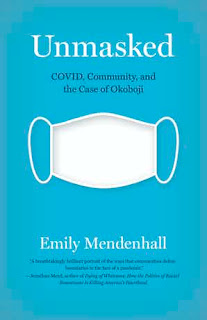 of Foreign Service at Georgetown University. Previously, she was a visiting Fellow at the London School of Hygiene and Tropical Medicine, National Institutes of Health Fogarty Scholar at the Public Health Foundation of India, and Post-Doctoral Fellow at the University of the Witwatersrand, where she still holds an Honorary Appointment. She received a PhD in anthropology from Northwestern University and MPH in global public health from Emory University. She lives in the DC area with her husband (Adam Koon), young daughters, and pup.
of Foreign Service at Georgetown University. Previously, she was a visiting Fellow at the London School of Hygiene and Tropical Medicine, National Institutes of Health Fogarty Scholar at the Public Health Foundation of India, and Post-Doctoral Fellow at the University of the Witwatersrand, where she still holds an Honorary Appointment. She received a PhD in anthropology from Northwestern University and MPH in global public health from Emory University. She lives in the DC area with her husband (Adam Koon), young daughters, and pup.
Mendenhall applied the “Page 99 Test” to her new book, Unmasked: COVID, Community, and the Case of Okoboji, and reported the following:
Unmasked delves into the complex ways people responded to COVID-19 in the author's hometown. A medical anthropologist who has studied the emergence and experience of illness around the world returned home to explain how and why people ignored public health guidelines and in many ways charted their own course for the pandemic response. In Iowa, few policies directed how people should behave after the Governor opened up the state in late April. When the economy ramped up in the tourist town, the community shifted their focus from the virus to the community. This was in part because many people make their year's income during the three months of tourism when the water heats up and people flock to the boats, beaches, and booze in Okoboji. When you turn to page 99 of Unmasked, the reader will realize how complex business interests were in resistance to public health guidelines for COVID-19. Businesses were interested in staying open for a tourist town in a community that depended upon the tourist season.Visit Emily Mendenhall's website.
In many ways, page 99 embodies the heart of the book: without strong policies in place, local individual and business interests took hold and drove community responses. Even when few people were masked and the restaurant decks were full, Unmasked describes how and why many locals stayed home and grappled with conflicting views on politics and risk for themselves and their loved ones. The author describes how most locals were very careful and even those who stated, "I don't fear the virus because I believe in God," quarantined when they were Covid positive. Others, however, actively rejected public health recommendations as government overreach and embodied a theory of building immunity (and some emphasized infecting others to achieve this for the community).
The divergent perspectives on the virus during that first pandemic summer caused everyday friction when some masked and most unmasked, breaking up friendships, book clubs, and families. Yet, many people eventually gave up their masks in part to align with in-group politics and move collectively through and beyond the pandemic when virus continued to cause social, economic, and biological stress around the world.
--Marshal Zeringue



